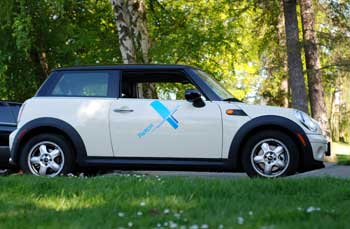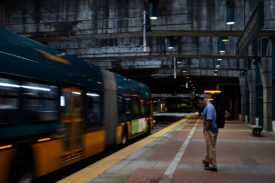Last week, Flexcar stationed one of its hundreds of hourly car-share vehicles outside our house. So, there’s now often a car sitting at the curb that we can use.
 |
Are we still car-less?
By our definition, yes. For my family, “car-less” never meant anything beyond not owning a car. Some people have misunderstood, thinking we’ve made a pledge not to drive (and teasing us for “cheating” when we do drive). We’re happy to drive; we just don’t own.
We don’t own the Flexcar. We didn’t pay anything to put it there (though we and our neighbors did ask for it). And it’s not standing by waiting for us. It’s shared with thousands of other Flexcar members, any of whom can reserve it for any period.
Still, it’s available to us a sizable fraction of the time. And when it is, it’s right there, staring us in the face—offering a private, door-to-door, non-aerobic ride, and the pleasures of a good radio.
Its existence blurs the boundaries of our fifteen-month-old car-less experiment. And that’s worth pondering.
The big difference between car-less and car-full, it turns out, is not whether you drive or not. It’s how much you drive: whether you purchase your driving by the car (and the tank) or by the hour (and the mile). (This incentive has trimmed our mileage by about two-thirds.)
It’s also whether you plan your trips in advance. (Because Flexcar must be reserved for a specific period, we have to figure out in advance when we’ll be back. This is sometimes a pain: if the softball practice runs over, we have to worry about getting back late and paying a fine for inconveniencing the next driver.)
On the plus side, we never deal with gas bills, oil changes, maintenance schedules, tire rotation, car dealers, insurance companies, car washes, timing belts (or anything else under the hood), theft prevention, repair bills, or the other dirty diapers of ownership.
We do not own a car, but we do have access to a fleet of about 200 cars in our metro area—and hundreds more in cities across the country: hybrid sedans, minivans, SUVs, pickups, convertible sports cars, Mini Coopers. They’re all standing ready to reserve for 30 minutes or three days. They’re all available at the swipe of a smart card: keys waiting in the glove box, (hybrid) engines tuned, 24/7 roadside assistance on call, gas tanks full or refillable for free with the onboard gas credit card.
So, are we car-less?
What do you think?








eldan
I think you’re car-less by your own definition, and what really matters is the effect you’ve pointed out whereby the number of miles driven by your whole household has dropped because of the altered economics of driving. That said, I don’t think that the initial year of living carlessly experiment would have been anywhere near as valid if you’d had this Flexcar within sight of home all along – anyone less lucky could easily dismiss it as having been enabled by a stroke of luck most households don’t have.
jeffy
We always use “car-free” when referring to our state of non-ownership. It’s still ambiguous since we, like you, do drive a fair amount, just nowhere near as much. Some of the stuff we’ve read uses “car-lite” which is maybe more accurate, but has less of an implication of the major focus shift. Lately, I’ve just been saying “I don’t own a car” whenever it’s even vaguely relevant to the conversation.And color me green with envy over your well-placed flexcar. There used to be one out here in Issaquah a few miles from our house (at the local PCC), but they took it away about a month before our car was totaled sending us on our car-free experiment (two years and counting).(bizarre aside: Do you notice that strange use of passive voice? “our car was totaled”. This kind of blame-evading language is all over car culture. If any blame is assigned it’s often to the car itself, very seldom the driver. What’s up with that?)
amfaste
Yes, you are car-less (less than the rest of us), and that is a good thing. I would probably label you O. P. (the old term smokers who were quitting would use…i.e., smoking ‘other people’s’ when the craving became too great) but that’s not quite accurate, since being a Flexcar member makes you part owner of a giant fleet. Nonetheless, you are setting a laudable example, esp. given the ages of your children. The challenge for us fools who still have cars is that we are preyed upon at times to fetch and carry in the name of the cause of the day by those who are down to bikes, bus and scooters. I am learning how much can be crammed in a Prius with the back seats folded down, and so are my Sustainable Ballard friends…
jeffrey.patterson
You’re carless to the extent you don’t own a car. However, as you point out, you do have access to a car – now even a Mini Cooper at that (I luv them).My own route to reduced GHGs has differed from yours. Assisted by life stage (children gained their own mobility by ageing and then leaving the parental nest), I just decided to drive a lot less and cycle when I can. I’ve subsequently reduced use of my personal car (16 y.o. SUV) from 16,000 > 4,000 km/yr and increased cycling to 10,000 km. While I could have allowed my son to wreck my car, I decided he wouldn’t have access. Whether carless or just less car-dependent, your glutes, quads, hamstrings and calves can be in awesome shape. I run as well (marathons), and even my cardiovascular system is vastly improved.
hearth
My wife and I just passed 12 years of living without an owned car (starting when our daughters were finishing college). We have used carsharing the past 7 years for the occasional trip (about twice a month). I use the term ‘car-lite living’ to describe our status as non-owners of a car. Chris Bradshaw, Ottawa, Canada
khooper
For me being car-less is not know how to be careful in driving. And also even if you are a Car Fanatic but you don’t know what are the rule in the driving still you are consider as car-less